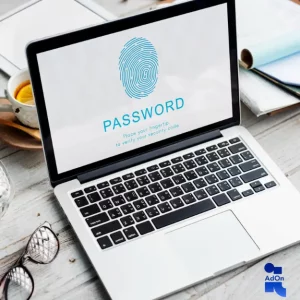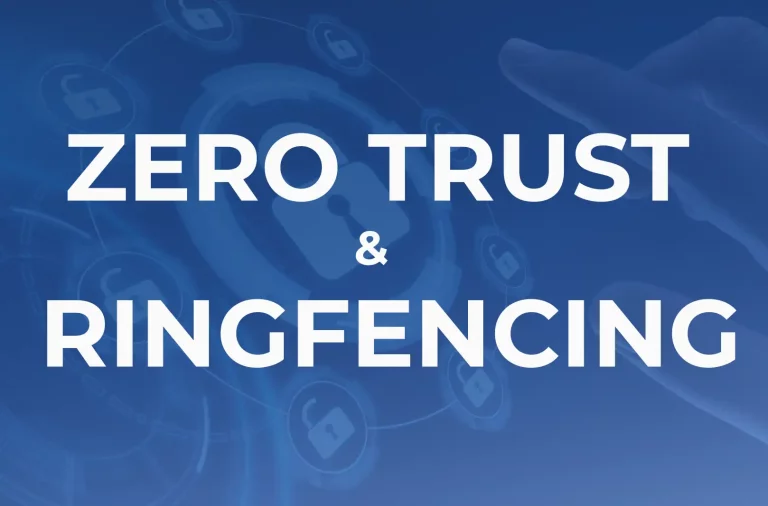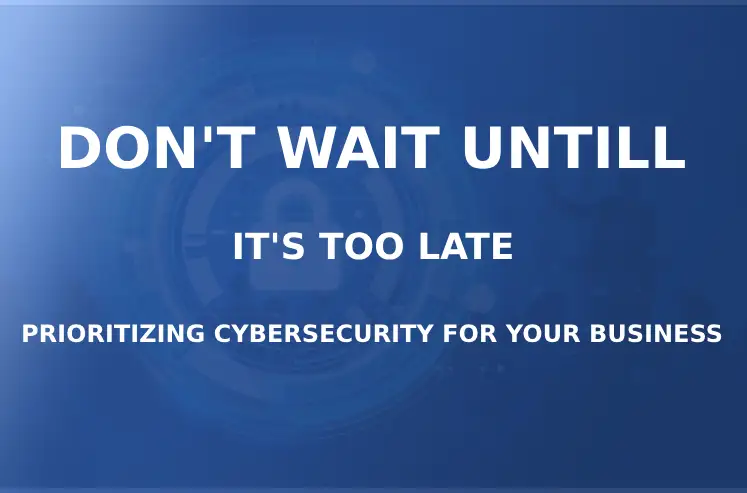Passkeys: The Future of Online Authentication
How would you feel if you could forget about having to remember dozens of passwords and usernames? Sounds like a dream come true, right? Well, there’s a new way to keep your data secure and it’s called passkeys.
Now, while they may sound like they’re just another type of password, they are actually more secure and reliable. The concept is simple—a passkey is a unique code or phrase that you create, that only you know. It grants access to all your online accounts without having to remember multiple passwords or usernames.
But it’s not just the convenience of using one passkey that makes it worth using; security is also taken into consideration which makes it even more attractive. In this article, we’ll take a deeper look at why passkeys are better than passwords for online security and how to set up your own personal passkey.
Introduction
Are you tired of dealing with passwords? Well, you are not alone! It’s no secret that passwords have become increasingly cumbersome and hard to remember, as sites now require more complex strings of characters. Unfortunately, the difficulty of remembering these passwords leads to people writing them down and leaving them laying around or using the same password across multiple sites – both with serious security consequences.
While it might feel like a never-ending cycle, there is a better option. Passkeys are a secure way for users to access their accounts without having to remember complicated usernames and passwords. Let’s take a look at why this technology is becoming increasingly popular and what it can mean for your online security.
The Problem with Traditional Passwords
Passwords have been the de facto authentication solution for decades, but that doesn’t mean they are secure. As we increasingly rely on passwords, hackers become smarter and more ingenious by the day. Traditional passwords have a few inherent weaknesses including:
- Reusing passwords: It may be tempting to reuse a password on multiple accounts, but this is an invitation to hackers who can easily pinpoint one user’s credentials once they gain access to one account.
- Weak passwords: Traditional passwords are no match for hackers—including easy-to-guess ones like “123456” or pet names.
- Password best practices: Many users are simply unaware of the security practices and strategies needed to keep their information safe—like changing their password regularly.
It’s also important to note that even when these password best practices are followed, they can still be easily compromised with phishing attacks and other malicious tactics. And traditional two-factor authentication methods like SMS verification codes can also be circumvented by hackers using sophisticated technologies.
The Rise of Passkeys
You’ve probably heard of passwords, but what about Passkeys? This new type of authentication is popping up everywhere and you might want to start considering it if you’re still using passwords. Not sure what they are? Let’s take a look.
What Are Passkeys?
Passkeys are an alternative to passwords—they use one-time codes to authenticate or access accounts, as opposed to remembering a string of characters for every single login.
How Passkeys Work?
When you sign up for a service that uses passkeys, the provider gives you two pieces: one is the physical token that generates the code, usually in the form of an app on your phone; the other is a secret key that’s added at the time of registration. When you initiate a login process, you’ll input your secret key and generate a code from your token. If both match with what’s stored by the original service provider, then you’re verified!
No need to worry about forgetting or losing track of all those passwords—with passkeys, each one-time code acts as its own password so security hackers can’t use multiple attempts and dictionary attacks to break into your accounts. Plus, by nature, these codes are always unique with each login so no one else can access them—even if someone knows your secret key. That’s why passkeys are fast becoming a popular authentication method, offering users greater peace of mind when it comes to security and privacy protection.
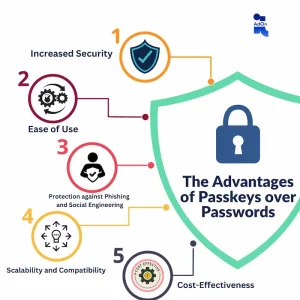
The Advantages of Passkeys over Passwords
You might not know it, but passkeys offer way more security than passwords. Here’s why:
Increased Security
As we mentioned before, passkeys are much more difficult to guess than a mere password. They are also encrypted in a cryptographic key exchange, making them virtually unhackable. This means you don’t have to worry about brute force attacks or password-guessing software that can make short work of your passwords.
Ease of Use
Passkeys are extremely easy to use, even for first-time users. All you have to do is insert the USB drive into your device (or tap it against other connected devices), and you’re good to go! No need for extra programs or complicated set-ups—just plug and play.
Protection against Phishing and Social Engineering
Passkeys provide an extra layer of protection against phishing attempts and social engineering attacks since all sensitive data is stored on the device itself and not on any remote systems or databases. This reduces the chances of someone intercepting your information and using it to gain access to your accounts.
Scalability and Compatibility
Unlike passwords which may only work with one type of system or device, passkeys can be used across multiple systems and devices with no hassle. Plus they can easily scale up as your needs grow over time with no changes required on the user side—talk about convenience!
Cost-Effectiveness
Finally, passkeys are extremely cost-effective compared to other identity management solutions out there. This makes them especially appealing for businesses looking for a secure way to manage their employees’ access without breaking the bank.
Passkeys in Action
One common way businesses use passkeys is through Microsoft Hello, which allows users to sign in with face recognition, fingerprint, or a PIN. Apple Face ID is another great example of passkey technology. It’s a facial recognition mobile authentication that unlocks your device with just a glance.
Today, the hottest trend in user authentication is the FIDO Universal 2nd Factor (U2F) Security Key. It requires users to have both the key and a password to access any online account. This increases security and makes it harder for hackers to gain unauthorized access. And unlike traditional passwords, FIDO U2F Security Keys are tamper-proof — so if they fall into the wrong hands, they’re useless.
These types of passkeys provide an extra layer of security for businesses and help protect their digital assets from malicious attacks or data breaches. Plus, they make it easier for users to authenticate their devices quickly and securely — ultimately increasing user engagement and productivity.
Case Study: Google’s Use of Security Keys
By now you know the benefits of using security keys for authentication, but did you know that Google implemented them on a company-wide scale?
Google started using FIDO U2F (Universal 2nd Factor) Security Keys for employee accounts in early 2017. In their words, “To protect users from phishing and other account hijacking techniques, Google requires all employees to use Security Keys.” So far, Google reports an impressive success rate with this system.
Results of Security Key Implementation
The results of their implementation are remarkable: they’ve seen zero successful phishing attempts since they started rolling out the keys. That means employees’ accounts are much more secure now that they rely on the keys.
Using security keys is not only effective, but it’s convenient too — no one needs to remember multiple passwords or struggle to regain access when they get locked out! Plus, security keys have become increasingly popular as a way to combat cyber-attacks and data breaches.
Google’s switch to security keys definitely proves that they are a viable and secure solution. Not only can they protect companies from phishing attempts but they also help businesses stay compliant with data protection regulations like GDPR (General Data Protection Regulation).
Passkeys in the Future
If you’re ready to say goodbye to passwords, you should know that passkeys are constantly improving and evolving. Here’s a look at the current trends in passkey technology:
Biometrics
Biometric authentication is becoming more popular, allowing users to use physical features like fingerprints to log in quickly and securely. It’s also one of the easiest methods, as all people need to do is touch the device they’re logging into.
Wearables
Wearables are becoming popular, as they allow users to have easy access to their devices with just a single tap or wave of the wearable itself. This is a great way for users to keep their devices secure without having to remember complicated passwords.
Ambient Authentication
Ambient authentication includes methods such as facial recognition and voice recognition. This type of authentication uses unique attributes such as a person’s face or voice to verify their identity, making it easier and more secure than traditional passwords. Ambient authentication also eliminates potential security issues associated with stolen or forgotten passwords.
The future of passkeys looks very promising, with advanced technologies continuing to be developed for security and convenience reasons. With so many options available, it won’t be long before passwords become obsolete!
Potential Applications of Passkeys
We’ve seen why passkeys are the future of authentication. But have you ever wondered what industries and applications that passkeys could be used for?
IoT Security
We already mentioned this one, but with the Internet of Things (IoT) continuing to infiltrate our lives, security is a major challenge. Passkeys offer a way to ensure that only authorized individuals can access and use different devices — from phones and computers to any other machine connected to the internet such as cars, refrigerators, and more.
Healthcare
Healthcare is another particularly promising application for passkeys. From protecting personal health records to helping protect vital assets like valuable pharmaceuticals or medical equipment, passkeys can help keep secure data safe and secure. No matter what type of healthcare setting you are in — whether you’re a hospital administrator or a doctor in private practice —passkeys offer secure authentication that speeds up the entire process of patient care.
Passkey Adoption
When it comes to adoption, passkeys are far more secure than passwords. That’s because passkey technology uses public-key cryptography to create a unique, private key that can only be used with its associated public key. This means that a hacker would need access to both keys in order to be able to steal your data.
Plus, this type of system is much easier for users since passkeys don’t require regular updating and resetting as passwords do; once you have the key pair, it lasts for however long you want it to. And if you need extra security, many systems let you use “multi-factor authentication” — which means that even if someone gets your passkey, they’d still need another form of authentication (like an additional code sent to your mobile phone) in order to gain access.
This allows users to keep their information safe without having the hassle of resetting their password every now and then or memorizing a long string of characters. Security doesn’t have to be a headache anymore!
Challenges to Passkey Adoption
You may think passkeys would be widely adopted without any fuss or challenge, but that’s just not the case. There are some key challenges to adopting passkeys:
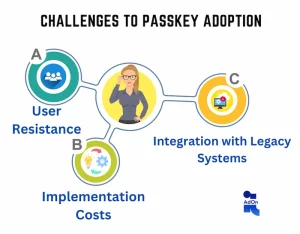
User Resistance
Of course, no one likes change — and people tend to resist new technologies. With passkeys, this isn’t a matter of needing to learn something new — because users don’t need to remember anything at all. However, change can still bring about some resistance for users who are used to passwords, and rely on them as part of their daily routine.
Implementation Costs
It takes time to develop a system for passkey authentication, and it could cost a lot of money too — especially if you need to integrate the authentication systems with your legacy systems. It’s essential that businesses carefully evaluate the costs associated with deployment, such as the cost of hardware or sensors required for installation.
Integration with Legacy Systems
Passkey authentication may require a company to completely replace any biometric systems they have in place today — or at least upgrade them significantly in order to integrate them with the new technology. This means making sure current databases work well with passkey authentication solutions and ensuring that existing customer accounts can be easily migrated over without difficulty.
Strategies for Passkey Adoption
One thing is for sure—to get people on board with passkeys, companies need to focus on education and rewards. Let’s explore the various strategies that could be employed by organizations to encourage passkey adoption:
Education and Awareness
It all starts with understanding the benefits of passkeys. Everyone needs to be aware of what they are, and why they are important. Organizations should provide training materials that make it easy for employees to understand why these digital keys are a better solution than passwords.
Incentives and Rewards
Organizations can also incentivize people to use their passkeys by offering rewards for their usage, such as giving discounts on company products or services. The idea here is to make the transition from passwords to passkeys attractive so employees want to switch.
Compliance and Regulations
Finally, companies should incorporate compliance requirements into their systems in order to ensure that everyone is following the necessary security protocols when using passkeys. This will ensure they remain secure at all times.
With these strategies in place, organizations can help ensure the successful adoption of passkey usage throughout their organization.
Key Takeaways
So, to summarize, here are the key takeaways about why passkeys are a better solution than passwords:
- They are significantly more secure than traditional passwords since attackers would need physical devices like cell phones or hardware tokens to access the private keys.
- Passkeys can also be configured to require biometrics for a higher level of security.
- The decentralized nature of passkeys means the burden of responsibility for securing passwords isn’t placed on one organization, making it less vulnerable to attack.
- Passkeys simplify authentication and make transactions easier and faster with fewer steps and no waiting times for password reset emails or phone calls.
This is only the beginning of the potential implications that replacing passwords with passkeys could have on online security. By taking advantage of this technology now marketers can create an environment that’s both secure and easy to use, while at the same time embracing customer demand for more secure identity management solutions.
Conclusion
As we’ve seen, passkeys technology is a much better solution than passwords when it comes to authentication. It’s fast, secure, and easy to implement, with no worries about lost or forgotten passwords. It’s an excellent way to improve the security of your online accounts and transactions.
Looking to the future, it’s clear that passkeys are the way forward. With the various advantages they offer, they are becoming the preferred choice for authentication purposes. As organizations embrace passkey technology, we will soon say goodbye to passwords once and for all.
Don’t let cyber threats compromise the security of your business. With ITAdOn’s top-notch cybersecurity solutions, you can rest assured that your valuable assets and data are fully protected. Our team of experts is ready to help you identify and mitigate any potential security risks to keep your business safe.
Get a free consultation! Call us today to learn more about our services and take advantage of this incredible offer. With ITAdOn, you can trust that your cybersecurity needs are in good hands. Contact us now and experience peace of mind like never before.

